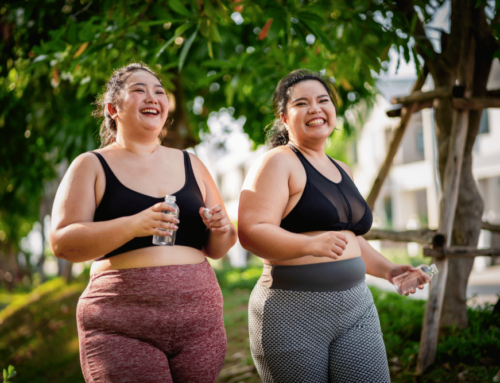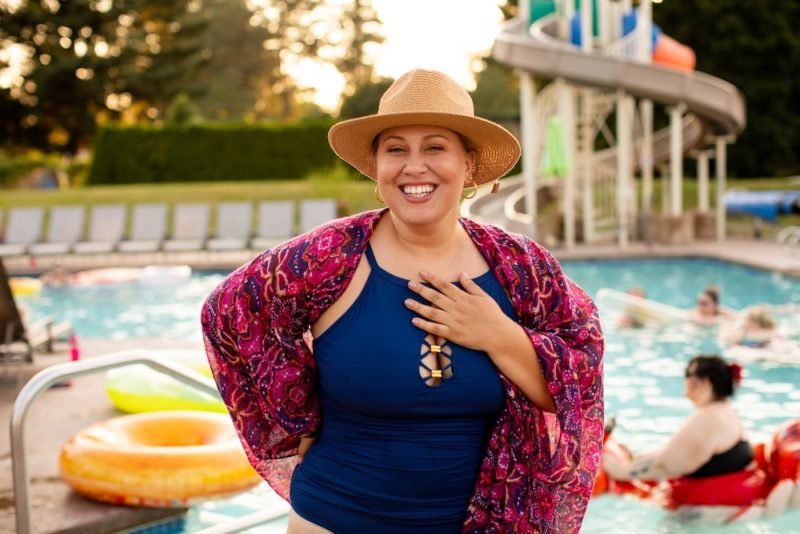
How different is your summer wardrobe from your winter wardrobe? Sure, you probably aren’t breaking out the wool sweaters right now, but are you still pretty much covered from neck to wrist to ankle? I’m guessing that you’re struggling with a lack of summer body confidence, and probably dealing with poor body image, generally.
When you don’t have fond feelings for your body — or at least its appearance — you might be hesitant to show more than a few inches of skin, even when the temperature rises. While the idea of baring more skin and being more on display may make you mentally uncomfortable, staying covered up can leave you physically uncomfortable for much of the summer, but it can interfere with summer activities.
It’s hard to cool off in a swimming pool, or a lake, or the ocean if you won’t put on a swimming suit. It’s hard to enjoy a hike on a warm day if you won’t wear shorts and a sleeveless shirt. It’s hard to feel like you don’t stick out like a sore thumb if you’re the only one at the barbecue covered from head to toe. It may be tempting to skip summer weddings or outdoor parties that call for bare arms and legs.
Maybe you feel like if you stay covered up no one will really know what your body looks like (which isn’t really true if it’s your size or shape you’re aren’t comfortable with). Maybe you’ve gained weight and don’t want to (or can’t really afford to) buy clothes that fit.
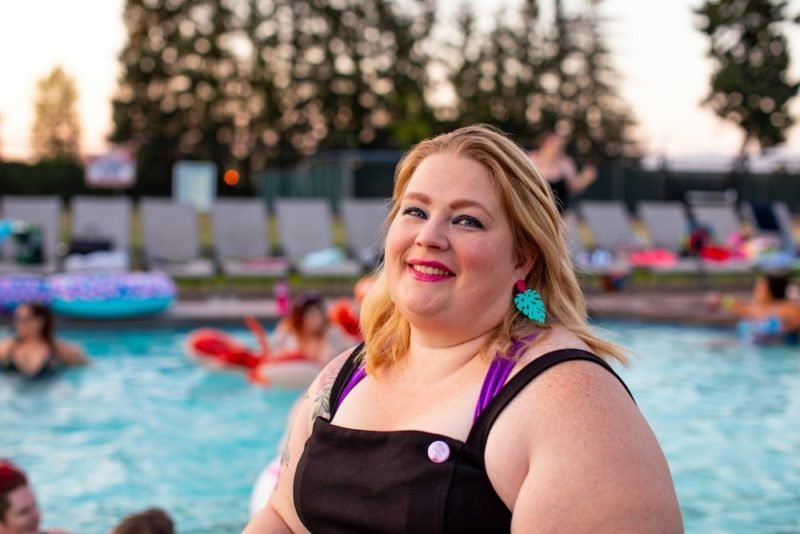
Is it modesty…or something else?
I want to pause for a moment and address the modesty issue. I fully realize that some people expose minimal skin due to personal or religious modesty. For example, I use to live in a Seattle neighborhood with a large Orthodox Jewish community, and both men and women stayed covered up in the summer. That said, for most people, you can dress to be physically comfortable in the summer without being “immodest” by modern standards.
You can wear a tank top without showing cleavage or side boob. You can wear shorts that don’t flash your butt cheeks. You can wear a bathing suit that you don’t fear falling out of.
You are using modesty as an excuse (not a legitimate reason) if you can answer “yes” to this question: “If I were…
- thinner
- more toned
- had less cellulite
- wasn’t as pale as snow
- had firmer skin
- didn’t have varicose veins
…would I show more skin in the summer?”

Show yourself compassion
When you’re anxious about your body, including when you’re wrestling between whether you’d rather be be physically uncomfortable (too hot) or mentally uncomfortable (too “exposed”), that’s hard. It’s a form of mental discomfort in itself, and that hurts. Maybe you’re thinking of just staying home rather than going to the barbecue or taking that nature hike…even though you would really like to go. That may make you feel lonely, even sad.
When you’re caught in one of those “What the best choice to minimize my discomfort” spirals, if you can manage to notice that you are, in fact, in a spiral, then breathe and allow yourself space for the thoughts and feelings you’re experiencing, that’s a valuable first step.
When you do this, you are being mindful (you’re aware that you’re having the thoughts you’re having, rather than simply being caught up in those thoughts) and that slight separation between you and your thoughts gives you the opportunity to hit the “pause” button so you can respond rather than react to what you’re experiencing.
Rather than react out of fear or anxiety, you can choose what to do based on other factors. How would you feel if you skipped the hike you love, or missed seeing friends/family at that gathering. How would it feel to enjoy yourself and pursue meaningful social connection? What would your future self prefer you do?
You can also show yourself some self-compassion, because, again, bad body image moments hurt. It’s hard to live in a society that tells us only certain bodies are “correct.”
If, like many people, you find it easier to show compassion to others than to yourself, try treating yourself the same way you would treat a friend who is having the same dilemma. “I’m sorry your struggling with this. It really sucks!” You might also think of what you would say to a friend who was considering skipping out on something they really want to do because it involves wearing shorts or a sundress, or considering going but wearing clothing that would make them hot and miserable…
Related Posts:
- Why self-compassion isn’t a zero-sum game
- How can self-compassion help ease body dissatisfaction?
- Why is self-compassion important? Because it’s not all rainbows and kittens.
- What is embodiment? The power of body stories

My own story of silliness
I’m not gonna lie. I have a history of body image issues that I’m mostly but not 100% over (recovery is a process). This involves weight (like many women, I have a past history of serial dieting), but even at my lowest weight, I did not want to show my legs. I had cellulite (which is totally normal yet still reviled). I’ve also had spider veins since my early 20’s, which eventually was followed up by varicose veins.
Then, in 2006, I spectacularly broke my left ankle. While it functions perfectly, thanks to surgery, an assortment of metal plates and screws, and physical therapy, it is permanently a little bigger than my right ankle. It also has some faded but still clearly visible (and quite large) surgical scars. When I’m on my feet for a long time, or the weather is hot, or I’ve been on a flight of more than a few hours, that ankle swells. We’re talking welcome to Cankleville.
While those ankle visuals don’t thrill me, I’m pretty much over them today. That was NOT the case in 2009, when we spent two weeks in Buenos Aires in February (their autumn). The weather was unusually warm, but what did I wear the ENTIRE time? Jeans. My husband was comfortable in shorts, while I was wearing a denim sauna from the waist down. I did wear short sleeves and tank tops, thank goodness. And sandals. But heaven forbid I show my ankle! What I really needed to be wearing was shorts and flowy skirts.
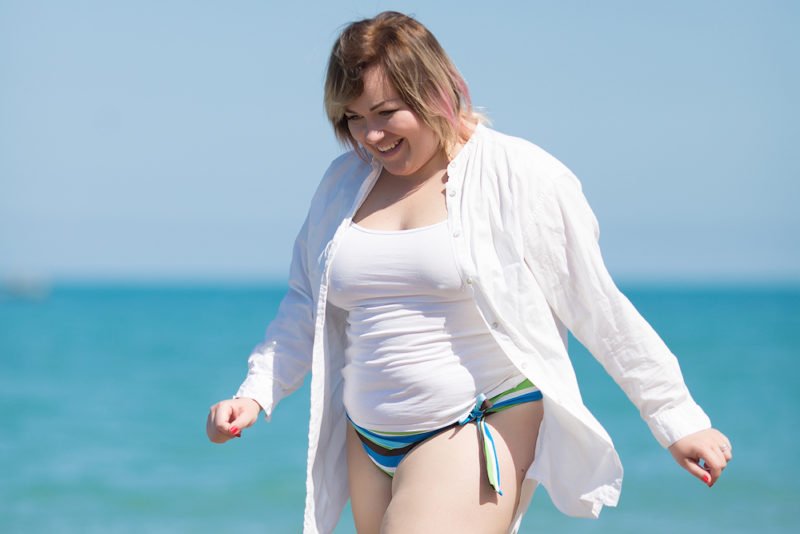
A few client stories
Having said all that, I’ll let you imagine how thrilled I am when one of my clients breaks through the self-consciousness barrier and allows themselves to dress appropriately for the summer weather.
A few years ago, one of my clients was a young mother who was working to embrace her significantly larger body after years of punishing diet and exercise programs, which culminated in her becoming injured. One of her goals was to work up the courage to wear shorts and tank tops. She started by wearing them around the house and in her own backyard. Then when running simple errands, like dropping her son off at camp, or taking him to the neighborhood park. Then she branched out to wearing them whenever the weather called for them.
Then came the bathing suit. She wanted to exercise again, but gently, so as to not injure herself again. She also wanted to try water aerobics…but this meant wearing a bathing suit in public. This was very hard for her, but she admitted that choosing a class where she was the youngest women by decades made it easier. Eventually, the feeling of being in the water won her over, and she was able to wear her bathing suit at an extended family gathering — and didn’t hide when her sister was taking candid photos of everyone.
Another client was taking a summer trip to Italy. It was going to be hot. There would be hiking, and yoga, and swimming. In spite of the body image struggles that piggybacked on the last weight regain in her long history of yo-yo dieting (a rollercoaster she had finally decided to step off of), she bought new shorts, sleeveless shirts and swimsuits for her trip. Comfort over needless vanity!
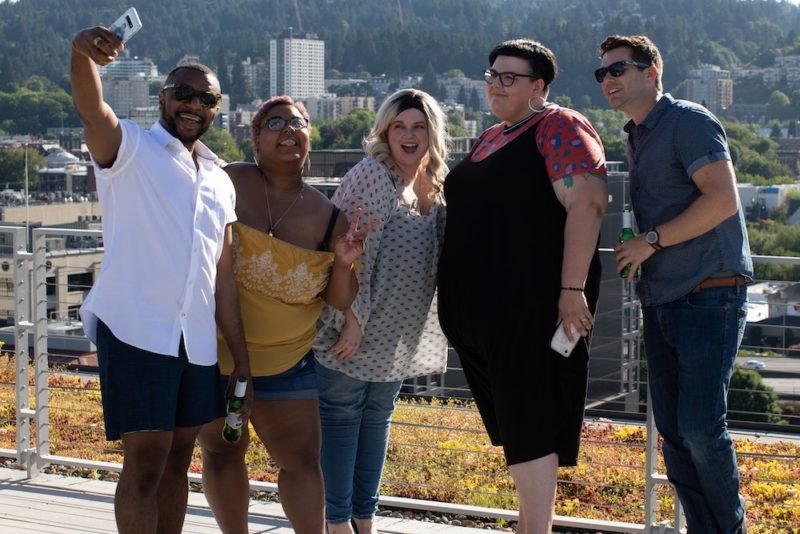
Your mission, if you choose to accept it
If some aspect of your body, whether it be size or cellulite or loose skin, is getting in the way of dressing comfortably in the summer, I (gently) challenge you to practice putting physical comfort first this summer. Here’s your “recipe” for improving your summer body confidence:
- Acquire some breezy clothes that fit and don’t make you feel TOO exposed (i.e., you don’t have to go for deep necklines or short-shorts). I personally like Universal Standard when I’m willing to pay a little more, but some of my summer staples come from Old Navy and Target.
- Take baby steps, as the first client I mentioned did. Start with your own backyard or balcony, then maybe a park near your home. Then maybe on a day trip when you’re bringing your own food so just stopping at parks or rest areas. In other words, minimal social “threat.” As you get more comfortable, and realize the world is still turning on its axis despite the fact you wore shorts in public, branch out.
- Whenever you feel the urge to cover up, repeat this mantra: “I deserve to be physically comfortable, and my mental discomfort will decrease as I get used to a new normal.” It’s true.
- If anyone ever does say anything rude, pardon me, but f**k them. Like, really. Let them go wallow in their rudeness and false superiority. You are better than that.
- Bonus: Go someplace where you will see bodies of all sizes wearing small clothing. When I’ve been on the beach in Waikiki, I saw all kinds of bodies in all sizes of swimwear and nobody gave a rat’s behind. When I visit a local lake each summer, I see all sizes and types of bodies in shorts and tank tops and swimsuits. And nobody gives a rat’s behind. When you rely on media (including advertising, movies and TV shows) to show you who is “allowed” to bare their legs and arms (and maybe waists) it’s easy to feel you don’t measure up.
Three podcasts that may be helpful, all featuring stylist Dacy Gillespie of Mindful Closet, are:
- “You’re Showing Up in the World, and Nobody is Fooled,” (Burnt Toast podcast hosted by Virginia Sole-Smith)
- “Repairing your relationship with food and body through finding your authentic personal style,” (Find Your Food Voice podcast hosted by Julie Duffy Dillon)
Carrie Dennett, MPH, RDN, is a Pacific Northwest-based registered dietitian nutritionist, journalist, intuitive eating counselor, author, and speaker. Her superpowers include busting nutrition myths and empowering women and men to feel better in their bodies and make food choices that support pleasure, nutrition and health. This post is for informational purposes only and does not constitute individualized nutrition or medical advice.
Seeking 1-on-1 nutrition counseling? Learn more about her Food & Body, IBS management, and nutrition counseling programs, and book an intro call to see if the program is a good fit, and if we’re a good fit!
Want exclusive content on nutrition, health, diet culture and more, plus critiques of nutrition and health journalism? Subscribe to my Food Noise newsletter! 📣
 Print This Post
Print This Post



